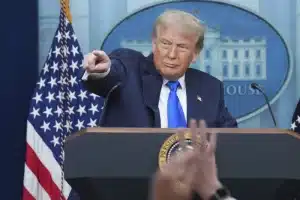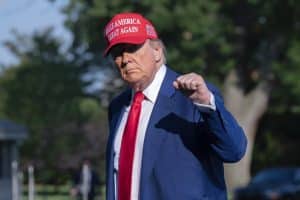In a significant decision Friday, the U.S. Supreme Court’s conservative majority ruled that federal judges do not have the authority to issue nationwide injunctions. However, the ruling left unresolved whether former President Donald Trump’s controversial restrictions on birthright citizenship could soon take effect in some parts of the country.
The decision marks a notable win for Trump, who had frequently criticized federal judges for blocking his initiatives through universal injunctions. Such injunctions had become a key legal barrier to his administration’s efforts to expand executive power and reshape immigration policy, frustrating Trump and his allies.
Despite the Supreme Court’s limits on broad judicial blocks, the justices did not definitively rule on whether Trump’s birthright citizenship order would remain halted nationwide. The policy, if implemented, would deny U.S. citizenship to children born on American soil to parents who are in the country illegally or on temporary visas.

The Supreme Court’s decision now sends the cases back to lower courts, where judges must revise their orders to align with the new high court ruling authored by Justice Amy Coney Barrett. According to Barrett’s opinion, enforcement of Trump’s birthright citizenship policy cannot begin for at least 30 days. Even after that period, legal observers warn that the ruling could create a confusing patchwork of differing rules between the 22 states that sued to block the policy and the rest of the country.
Both the Trump administration and the Biden administration had argued that judges were overstepping their authority by issuing broad nationwide injunctions instead of limiting their rulings to the parties involved. Since Trump began his second term in January, federal judges have issued more than 40 such universal injunctions against his policies.
The administration has repeatedly appealed these orders to the Supreme Court, including those related to the birthright citizenship restrictions. While the court rarely takes up emergency matters from its so-called “shadow docket,” it made an exception in this case. Barrett wrote in the decision that federal courts “do not exercise general oversight of the Executive Branch; they resolve cases and controversies consistent with the authority Congress has given them.” She added, “When a court concludes that the Executive Branch has acted unlawfully, the answer is not for the court to exceed its power, too.”
Speaking at the White House shortly after the decision, President Trump called the ruling “amazing” and described it as a “monumental victory for the Constitution,” praising its reinforcement of separation of powers and the rule of law.
However, Senate Democratic leader Chuck Schumer voiced alarm on X, calling the decision “an unprecedented and terrifying step toward authoritarianism, a grave danger to our democracy, and a predictable move from this extremist MAGA court.” Justice Sonia Sotomayor, writing for the court’s three liberal justices in dissent, described the ruling as “nothing less than an open invitation for the government to bypass the Constitution,” arguing it could allow the administration to enforce policies found unconstitutional by lower courts while appeals play out.

Justice Sonia Sotomayor noted in her dissent that the administration had not even requested a complete block of lower court rulings in this case, as it had in other challenges. “To get such relief, the government would have to show that the order is likely constitutional, an impossible task,” Sotomayor wrote.
Justice Amy Coney Barrett, writing for the majority, emphasized that the Supreme Court was not addressing the ultimate legality of the birthright citizenship policy itself but instead only the rules governing how the cases would proceed.
In response to the high court’s decision, rights groups challenging Trump’s policy quickly filed new motions in lower courts, pursuing a path suggested by Justice Brett Kavanaugh. In a separate concurring opinion, Kavanaugh indicated that judges could still protect anyone potentially affected by the birthright citizenship changes by designating them as members of a “putative nationwide class.”
States challenging the policy also pledged to continue their legal fight, arguing that a nationwide block is the only effective way to safeguard their residents.
“We have every expectation we absolutely will be successful in keeping the 14th Amendment as the law of the land and, of course, birthright citizenship as well,” said Massachusetts Attorney General Andrea Campbell.
Birthright citizenship, rooted in the 14th Amendment following the Civil War, guarantees U.S. citizenship to nearly all children born on American soil, including those born to undocumented or temporary migrants. A landmark Supreme Court decision in 1898, United States v. Wong Kim Ark, confirmed that only children of diplomats, occupying enemies, foreign-flag vessels, or sovereign Native American tribes were excluded from this automatic right.
Globally, around 30 countries — including Canada and Mexico — apply the principle of jus soli, or “right of the soil,” to grant citizenship at birth.
Trump and his supporters have argued for stricter standards, describing citizenship as “a priceless and profound gift” in the executive order signed on his first day in office. The administration’s legal position claims that children of noncitizens are not “subject to the jurisdiction” of the United States under the 14th Amendment, and therefore not entitled to automatic citizenship.
Opponents, including immigrants, civil rights advocates, and state governments, have accused the administration of trying to undermine well-established constitutional protections. Judges so far have uniformly ruled against Trump’s interpretation.
The Justice Department argued that no single judge should be able to impose a nationwide order affecting people beyond those directly involved in the case. Instead, the administration had asked the Supreme Court to let Trump’s policy proceed for everyone except those who had sued, or, at minimum, keep the block in place only in the 22 states involved in the current lawsuit.
New Hampshire, meanwhile, is subject to a separate court order not included in this Supreme Court case.
The high court also agreed that the administration is permitted to issue public announcements about how it would implement the policy if it is ultimately allowed to take effect.







